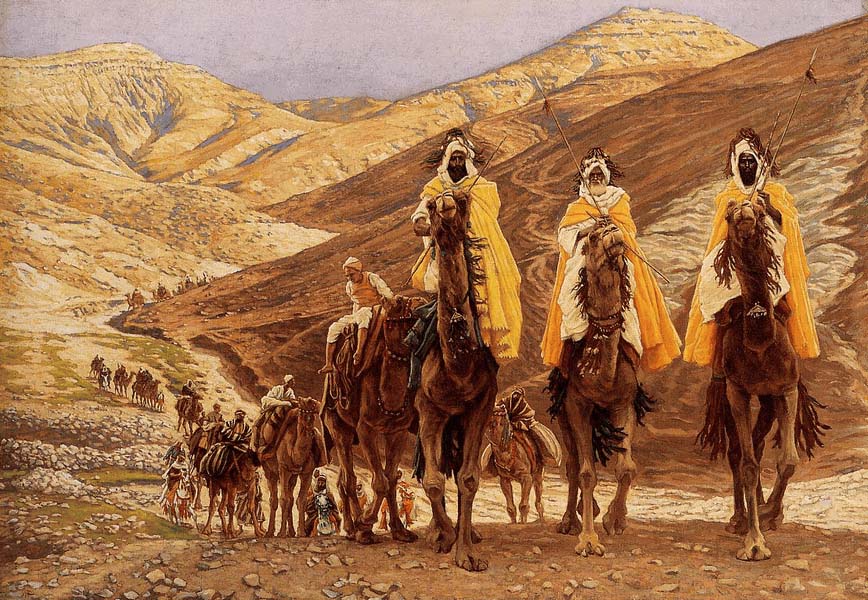 Matthew 2:11 And when they mere come into the house, they saw the young child and Mary his mother, and fell down, and worshipped him, and when they had opened their treasures, they presented unto him gifts; gold, and frankincense and myrrh.
Matthew 2:11 And when they mere come into the house, they saw the young child and Mary his mother, and fell down, and worshipped him, and when they had opened their treasures, they presented unto him gifts; gold, and frankincense and myrrh.The Worship of the Magi
The foregoing history furnishes us with the following useful hints of instruction:
1. Extraordinary appearances in the natural world should put us upon inquiries after God. Thus the appearance of an uncommon star, which they had never taken notice of before, put the wise men upon seeking after Christ.
2. The zeal and devotion of good men often stir up the envy, malice, and fury of wicked men. Whilst the wise men were engaged in seeking Christ, Herod was forming schemes to destroy him.
3. The most pernicious designs have sometimes been carried on with hypocritical pretences of religion. "Bring me word," says Herod, " that I may come and worship him also."
4. Inquiries after Christ shall not be left destitute of those aids which are necessary to find him. The star which had disappeared returns again; and what that star was to these eastern sages, that the word of God is to the humble penitent - the doubtful but diligent inquirer after Christ.
1. The persons spoken of, concerning whom we may venture to say the following things
1. They were strangers and foreigners
2. They were Gentiles brought up in heathenish idolatry
3. They were persons of great wisdom and learning
I proceed to notice
2. The several acts ascribed to these persons
1. They came into the house and saw the young child and Mary his mother. Here you may observe
(1) They found him who they had earnestly and diligently sought after. The Lord Jesus Christ, like his Father, never says to the seed of Abraham "Seek me in vain."
(2) They found him where they did not expect to find him; they sought him under the character of the King of the Jews, and they found him,—not in Jerusalem, the metropolis of the country, but in Bethlehem Ephratah, which was little among the thousands of Judah,—not in a royal palace, but a common inn,—not surrounded by nobles, but it is probable, by the poorest of the people.
2. They fell down, and worshipped him. The external posture of their body was expressive of the internal frame of their mind. They not only paid him civil honour, but divine adoration. They not only reverenced him as a superior, but worshipped him as a god.
3. They opened their treasures, and presented unto him gifts; gold, frankincense and myrrh. He had given them riches, and they now gave them back to him again. Here we may observe
(1) These were commodities with which their country abounded - the produce of the land from which they came.
(2) These were valuable and useful commodities, even where they were most plentiful.
(3) These presents might be said to be royal ones.
(4) Though I cannot suppose that these presents had a figurative and symbolical meaning in them, yet they may lead us to think of such things as these, which, when properly presented, will always be acceptable to the Lord Jesus Christ.
The gold may point out to us a pure heart, refined from the dross of corruption, and possessed of a principle of divine grace.
The frankincense may put us in mind of holy and humble prayer, fervent and devout affections.
The myrrh may with propriety be accommodated to patient suffering; for though sweet to the smell, it is bitter to the taste.
I shall conclude with two observations.
1. As the wise men came into the house, and there saw Christ, so we should seek him in his word and ordinances. Many do not find Christ, because they seek him without doors and not in the house. They are not successful in their inquiries after him, because they do not seek him in an acceptable manner, and where he is to be found.
2. As the wise men brought presents to Christ, so should we: and what? Why, broken hearts, gracious affections, holy desires; or, if we have not these to bring, let us bring what we have - our griefs and sorrows, burdens and complaints, sins and corruptions, for remember no-one must appear before him empty. If we cannot bring what is pleasing that he may receive it, we should bring what is offensive, that he may take it away.











No comments:
Post a Comment